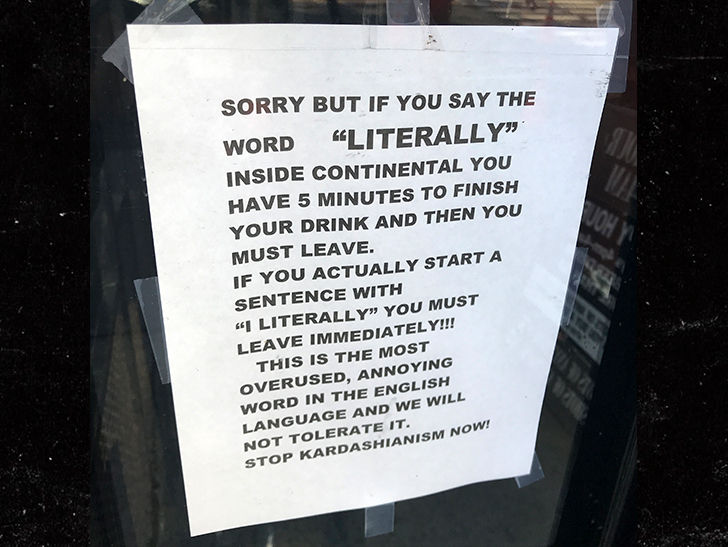Parasite words in English
Everybody uses the word-parasites in English. Well, or almost all - the Queen of England does not count. As soon as you ask a British or American a question you need to think about, these "emm ...", "you know ...", "like ..." begin immediately.
In Russian, they spear words for parasites — they say, uncivilized and in general. And in English it is quite normal. Even they are called neutral - “fillers” or “placeholders”, which is quite logical - they fill the empty space in the sentence, if you need an extra second or to convey emotions more deeply.
Sometimes they are called "crutches" - "crutches", which is also logical. In Russian, too, sometimes without crutches will not do.
')
Steve Farrell and Jimmy Fallon do not worry about parasitic words at all. For 20 seconds, they used 8 parasitic words for two, not counting emm and eh. Can you identify them by ear?
In this article we decided to collect a number of the most common parasitic words in English. So that, so to speak, you could express your thoughts as a carrier. And understand what they say to you.
Immediately from the universal. “Like” as a filler word is something like Russian “as if”. It can be inserted as you like, anywhere and as many times as you like. In any case, many people do just that.
There are several common principles for using “Like” as a filler.
When a person is not completely sure of the information he is talking about.

With translation, of course, in such cases it is difficult, because like in the context can be translated as you please: “well”, “pancake”, “as if”, “type” and a dozen more options.
The guys from the channel Seriously Guys shot an interesting video, in which they ridiculed the excessive use of the “Like” filler word. We recommend to see:
Literally, the phrase translates as "Well, you know." But in fact, they say it when they just want to draw the interlocutor’s attention to their words or stir them up a little.
In English, the phrase is quite correct and it can be heard even among aristocrats. Its use is not considered a move. Of course, if you speak it not too often.
True, in Russian "well, you know" sounds a bit like hitting. Therefore, those people who have Russian native, a little afraid to use "you know" in English. After all, there remains a subtle feeling that with its help you slowly turn into some kind of gopar.

In fact, do not be afraid of this phrase. In personal communication, she helps to keep attention on herself, and even in public speeches she is used quite often.
Daniel Redcliffe is a storehouse of fillers. In an interview with Jimmy Fallon, they are just a bunch. "You know" is also there, and in good quantity. And there is also like, well, basically, so and a whole lot more. Although the interview itself is also interesting.
Literally means "let me think." The result is also literal - this phrase gives a little time to think.
Most often it is used when answering a question. For example:

To get even more time to think and not to be silent, after “let me think” the native speakers often repeat the essence of the question or even the question itself. The result is almost an eternity for reflection, during which you can combine the general theory of relativity and quantum mechanics.
In practice, the phrase can be pronounced very quickly, like “lemme think”, so for some characters this is more like a voice command and the launch of the “Think” program.

“Sort of” is more used by the British, “kind of” - by the Americans. But these phrases mean the same thing - something like a Russian “type”.
They soften the effect of the next word or phrase a little. Important! Mitigates any effect, both negative and positive. For example:
In colloquial speech “kind of” and “sort of” are very rarely pronounced correctly, uttering all sounds. Most often they sound like “kinda” or “sorta”.
In some cases, the phrase “kind of” is not considered a filler, but is synonymous with “something like.” For example:
PS The picture above is the cover of the Queen's “Kind of magic” album. So "Type Magic".
When the interviewee wants to be perceived literally, he says “literally.” But the thing is that this word has almost lost its personal meaning, so no one will literally take it.
Therefore, the phrase “I literally died” will be interpreted in a figurative sense, even despite the presence of the word “literally”.
Literally as a filler, it reinforces the emotional background of the sentence, but does not make the phrase more serious and truthful.

An announcement for visitors to the Continental Bar in New York appeared on the Web, which immediately became viral.
[Translation of the inscription: “We are sorry, but if you say the word“ literally ”in this bar, you will have 5 minutes to finish your drink, after which you must leave. If you start a sentence with the phrase “I literally”, you must leave the bar immediately! This is the most overly used and annoying word in the English language, and we will not tolerate it. Stop the Kardashyanisms now!]
As you may have guessed, Kim Kardashian uses literally literally through a sentence. Pun, hey!

If we have a neutral attitude to the previous filler words, then this is sharply negative. This is because it specifically zadolbalo all, because the Kardashian family is not shown only on kettles.
If you still want something to fill the gap in speech, use actually. The value of it is almost the same - "in fact", "in fact." You can also use “basically” - “basically”, “in essence”, “in principle”. The result will be the same, but hating you will also be much less than with literally.
Small word, but with great potential. And all because it ends in a vowel, and it is so convenient to stretch it. You don't know what to say, and such a “So-ooooo”.
It is translated as the Russian introductory "Tak." Most often used when they say some conclusions or somehow summarize what has been said. In general, it is not a parasite, but sometimes it is used too often.
Important! The filler will only be “so” as an introductory word at the beginning of the sentence.
We at EnglishDom have a wonderful teacher who often speaks to the participants of the talk club “Let's be today without wells”. This code phrase means a request that pupils do not use parasitic words during speeches or dialogues.
Why is that? Because one of the meanings of the word “well” is “well”. Another pun.
“Well” you can say anywhere, anytime, and as much as you like. In any case, many native speakers think so. Therefore, it is used during each pause.
Well, as a filler, it is translated as “well,” or if it is very close in terms of the colloquial meaning, then “well.”
***
Naturally, this is not all the words-parasites, which are found in English. They are much more.
Filler words are a good way to get a few extra seconds to think about a thought or phrase. But the main rule is to moderate them. A couple of these words will show your knowledge and feeling of the language, but the fillers in each sentence will show an uneducated person. So keep the balance.
For a snack, we left, rather, not words-parasites, but sounds-parasites. Different Em, Oh, Er and other incomprehensible lowing in all languages sound the same and annoy everyone equally. So try to speak without them. Seriously, it is better to replace them with the words "like" or "well". And then you will express your thoughts like Viktor Yanukovych:
Learn English and correctly use filler words in your speech.

→ Study in the online game mode - download in English on the online courses from EnglishDom.com.
According to the link - 2 months of premium subscription for all courses as a gift.
→ For live communication - choose individual training via Skype with a teacher.
The first trial lesson is free, register here. The promo code goodhabr2 - 2 lessons as a gift when buying from 10 lessons. The bonus is valid until 05/31/19.
In Russian, they spear words for parasites — they say, uncivilized and in general. And in English it is quite normal. Even they are called neutral - “fillers” or “placeholders”, which is quite logical - they fill the empty space in the sentence, if you need an extra second or to convey emotions more deeply.
Sometimes they are called "crutches" - "crutches", which is also logical. In Russian, too, sometimes without crutches will not do.
')
Steve Farrell and Jimmy Fallon do not worry about parasitic words at all. For 20 seconds, they used 8 parasitic words for two, not counting emm and eh. Can you identify them by ear?
In this article we decided to collect a number of the most common parasitic words in English. So that, so to speak, you could express your thoughts as a carrier. And understand what they say to you.
Like
Immediately from the universal. “Like” as a filler word is something like Russian “as if”. It can be inserted as you like, anywhere and as many times as you like. In any case, many people do just that.
There are several common principles for using “Like” as a filler.
When a person is not completely sure of the information he is talking about.
He's like 30 years old.When he highlights in his speech a quote from another person or his own quote.
He seems to be thirty.
Oh, she's so annoying. Every time I come to her she's like: “Oh, darling, have you seen the boy? He's so weird ... "The most interesting. Like can be used everywhere. Situationally, it can play the role of "placeholder void". When I forgot a word, I didn’t know it at all, or if an extra second is needed for a flight of thought, that’s useful.
Oh, she annoys me so much. Every time I come to her, she’s like, “Oh, honey, have you seen Sarah’s new boyfriend? He is so strange ... "
This is a package for a guy from 1955!
Well, the thing is that this package should have been delivered to a guy from 1955.

With translation, of course, in such cases it is difficult, because like in the context can be translated as you please: “well”, “pancake”, “as if”, “type” and a dozen more options.
The guys from the channel Seriously Guys shot an interesting video, in which they ridiculed the excessive use of the “Like” filler word. We recommend to see:
You know / you know what
Literally, the phrase translates as "Well, you know." But in fact, they say it when they just want to draw the interlocutor’s attention to their words or stir them up a little.
In English, the phrase is quite correct and it can be heard even among aristocrats. Its use is not considered a move. Of course, if you speak it not too often.
True, in Russian "well, you know" sounds a bit like hitting. Therefore, those people who have Russian native, a little afraid to use "you know" in English. After all, there remains a subtle feeling that with its help you slowly turn into some kind of gopar.

In fact, do not be afraid of this phrase. In personal communication, she helps to keep attention on herself, and even in public speeches she is used quite often.
Patient with your business needs.There is no difference between "you know" and "you know what". The only thing that the second gives a split second more time, and even after it you can make an epic pause for a few seconds - and it will look appropriate. Something like: “wait, friend, now there will be a wise phrase”.
You know, you need to be patient for your business - it takes time.
Daniel Redcliffe is a storehouse of fillers. In an interview with Jimmy Fallon, they are just a bunch. "You know" is also there, and in good quantity. And there is also like, well, basically, so and a whole lot more. Although the interview itself is also interesting.
Let me think
Literally means "let me think." The result is also literal - this phrase gives a little time to think.
Most often it is used when answering a question. For example:
- I don’t know where to get some good pizza?
- Let me think ... Good pizza ... Oh, there is a great pizzeria just a few blocks up.
- You do not know where we could eat delicious pizza?
- Let me think ... Tasty pizza ... Oh, there are a great pizzeria a couple of blocks higher.

To get even more time to think and not to be silent, after “let me think” the native speakers often repeat the essence of the question or even the question itself. The result is almost an eternity for reflection, during which you can combine the general theory of relativity and quantum mechanics.
In practice, the phrase can be pronounced very quickly, like “lemme think”, so for some characters this is more like a voice command and the launch of the “Think” program.
Kind of / sort of

“Sort of” is more used by the British, “kind of” - by the Americans. But these phrases mean the same thing - something like a Russian “type”.
They soften the effect of the next word or phrase a little. Important! Mitigates any effect, both negative and positive. For example:
He's kind of nerd.That is, while only "similar", but not the fact that a person is a nerd. The second example is more vital:
He looks like a nerd.
I'm kind of like you.That is, like you, but no. Although yes, but just a little bit. And generally went nafig.
I like you like that.
In colloquial speech “kind of” and “sort of” are very rarely pronounced correctly, uttering all sounds. Most often they sound like “kinda” or “sorta”.
In some cases, the phrase “kind of” is not considered a filler, but is synonymous with “something like.” For example:
- What is a quince?So be careful and do not confuse where the filler, and where the normal part of the sentence. And a small secret - if the “kind of” can be thrown out of the sentence, and the meaning remains almost the same, then it is still a parasite.
- It’s like spiced lemon.
- What is quince?
- It's something like an apple, but it tastes like a lemon with spices.
PS The picture above is the cover of the Queen's “Kind of magic” album. So "Type Magic".
Literally
When the interviewee wants to be perceived literally, he says “literally.” But the thing is that this word has almost lost its personal meaning, so no one will literally take it.
Therefore, the phrase “I literally died” will be interpreted in a figurative sense, even despite the presence of the word “literally”.
Literally as a filler, it reinforces the emotional background of the sentence, but does not make the phrase more serious and truthful.

An announcement for visitors to the Continental Bar in New York appeared on the Web, which immediately became viral.
[Translation of the inscription: “We are sorry, but if you say the word“ literally ”in this bar, you will have 5 minutes to finish your drink, after which you must leave. If you start a sentence with the phrase “I literally”, you must leave the bar immediately! This is the most overly used and annoying word in the English language, and we will not tolerate it. Stop the Kardashyanisms now!]
As you may have guessed, Kim Kardashian uses literally literally through a sentence. Pun, hey!

If we have a neutral attitude to the previous filler words, then this is sharply negative. This is because it specifically zadolbalo all, because the Kardashian family is not shown only on kettles.
If you still want something to fill the gap in speech, use actually. The value of it is almost the same - "in fact", "in fact." You can also use “basically” - “basically”, “in essence”, “in principle”. The result will be the same, but hating you will also be much less than with literally.
So
Small word, but with great potential. And all because it ends in a vowel, and it is so convenient to stretch it. You don't know what to say, and such a “So-ooooo”.
It is translated as the Russian introductory "Tak." Most often used when they say some conclusions or somehow summarize what has been said. In general, it is not a parasite, but sometimes it is used too often.
So-ooo, the movie is better.The only caveat, in Russian, the word "so" is used only before the conclusions. In English - at the beginning of almost any sentence. It seems to emphasize the significance of everything that will be said after.
Ita-ak, the film is good, but the book is better.
Important! The filler will only be “so” as an introductory word at the beginning of the sentence.
This burger tastes so-ooo good.Here, if you do not stretch “so”, it will not turn into a parasite, because in this case it shows the emotional depth of the burgerophile.
This burger is tako-oh-oh delicious.
Well
We at EnglishDom have a wonderful teacher who often speaks to the participants of the talk club “Let's be today without wells”. This code phrase means a request that pupils do not use parasitic words during speeches or dialogues.
Why is that? Because one of the meanings of the word “well” is “well”. Another pun.
“Well” you can say anywhere, anytime, and as much as you like. In any case, many native speakers think so. Therefore, it is used during each pause.
Well, as a filler, it is translated as “well,” or if it is very close in terms of the colloquial meaning, then “well.”
Well, if you ask me, I'd call her, well, pretty smart.Moreover, in English, “well” as a parasite word is perceived as something better and more natural. But the Russian "well" is like a sickle for a causal place. "Well" too often is better not to use, but you need to remember.
Well, as for me, she is, well, smart enough.
***
Naturally, this is not all the words-parasites, which are found in English. They are much more.
Filler words are a good way to get a few extra seconds to think about a thought or phrase. But the main rule is to moderate them. A couple of these words will show your knowledge and feeling of the language, but the fillers in each sentence will show an uneducated person. So keep the balance.
Mini bonus
For a snack, we left, rather, not words-parasites, but sounds-parasites. Different Em, Oh, Er and other incomprehensible lowing in all languages sound the same and annoy everyone equally. So try to speak without them. Seriously, it is better to replace them with the words "like" or "well". And then you will express your thoughts like Viktor Yanukovych:
Learn English and correctly use filler words in your speech.
EnglishDom.com - online English learning platform

→ Study in the online game mode - download in English on the online courses from EnglishDom.com.
According to the link - 2 months of premium subscription for all courses as a gift.
→ For live communication - choose individual training via Skype with a teacher.
The first trial lesson is free, register here. The promo code goodhabr2 - 2 lessons as a gift when buying from 10 lessons. The bonus is valid until 05/31/19.
Source: https://habr.com/ru/post/431178/
All Articles